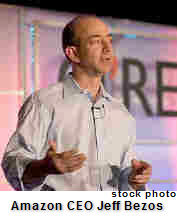Amazon's Bezos: We make muck so you don't have to


Referring to IT infrastructure, Bezos made a couple of key points on which most of his argument is based, one of which is that having an excellent IT infrastucture is "the cost of admission." Without it, said Bezos, you're not in the game. Although in slightly different context, Bezos also talked about how many businesspeople think their "secret sauce" is so secret that they have to keep it to themselves. But the two points go together to make a convincing argument that IT is not nearly as differentiating of a factor to a business as some would like to believe.
Bezos estimates that as much as 70 percent of most companies' resources today are spent doing technology-related heavy lifting when, in reality, 70 percent of a company's resources should be spent focusing on differentiators. To make matters worse, all that heavy-lifting leads many organizations down a path of heterogeneity that's eventually becomes impossible to manage. For example, despite the best intentions of IT managers, data centers end up cluttered with multiple instances of the same operating system (some patched, some not) on multiple server types on multiple storage systems, all requiring highly specialized care and feeding -- a situation that Bezos says amounts to muck.
So, what's the answer? The bottom line is to outsource all of that complexity to a "Web scale" architecture, the interface to which is nothing more than some simple APIs. Saying "We make muck so you don't have to," Bezos described several of many APIs to IT infrastructure-level services that Amazon is either currently offering or testing. The most recent of these, now in beta, is a service called EC2 (Elastic Compute Cloud) that could be the closest thing to pay-as-you-go general purpose utility computing. The service is relatively simple. Businesses (or developers) create their favorite server OS images and then, through Amazon's EC2 APIs, they can dynamically provision as many instances of those images as they want. The idea, if successful, could wipe out traditional hosting as we know it today (who woulda thunk it).
Said Bezo's of EC2, the infrastructure -- which is fully backed by the multiple geographically distributed datacenters that Amazon runs for itself -- you can run the equivalent of one CPU for $70 per month, or for the same $70 you can use 700 CPUs for an hour. Because of how Amazon's datacenters are behind the service, a lot of the heavy-lifting that normally goes into the aforementioned "excellence" -- things that relate to peformance, reliability, and scaleability -- are simply an attribute of the service. In other words, it's muck that customers of Amazon's EC2 service don't have to worry about, thus allowing them to invert the 30/70 rule (where 30 percent of a company's resources are focused on differentiation) to be more like a 70/30 rule.
For a Web-scale computing service like EC2 to work, Bezos said it must feature the following:
- elastic capacity
- fast
- always available
- rock solid reliability
- very simple
- cost effective
- low scale up front investment